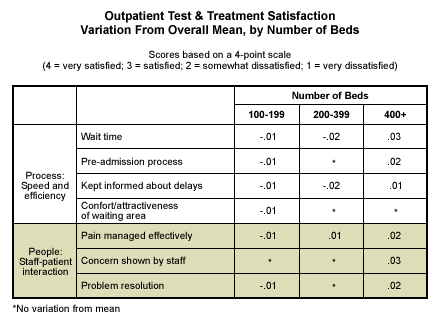The conclusion of a series on the effects of hospital size on patient satisfaction
Outpatient test and treatment services differ somewhat from the other three healthcare service areas for which �鶹��ýAV measures patient satisfaction (inpatient, outpatient surgery, and the emergency department) in that they encompass a broad mixture of procedures, including laboratory, radiology, and physical rehabilitation. Given that fact, how might a hospital's size affect patient satisfaction in this area?
As with the other three areas, we identified seven patient satisfaction items in �鶹��ýAV's aggregated healthcare database that most differentiate "average" hospitals from "best-practice" hospitals in the outpatient test and treatment area -- four of them are "process" items (meaning they relate mostly to hospital operations), the other three are "people" items (relating mostly to staff-patient interactions). We then examined the variation from the mean scores on each item for three hospital size categories: 100 to 199 beds, 200 to 399 beds, and 400+ beds.

Overall, results show that there is relatively little difference among hospital size categories when it comes to patient satisfaction with outpatient test and treatment services. However, the differences that exist exhibit a different pattern from those for inpatient, outpatient surgery, or emergency departments. While smaller hospitals tend to score higher than larger hospitals in each of the other three categories, the opposite is true for outpatient test and treatment.
The average score among the smallest hospitals is just below the mean on nearly every item, while the largest hospitals score highest on wait time (.03 above the mean) and concern shown by staff (.03 above the mean). The average score for mid-sized facilities is somewhere in-between and does not vary from the mean in either direction on three of the seven items.
The tendency of larger hospitals to receive higher satisfaction scores than smaller hospitals in the outpatient test and treatment area raises some interesting policy questions. Outpatient test and treatment facilities that are contained within larger hospitals tend to have higher costs than smaller, independent outpatient test and treatment facilities, and are therefore more expensive to use.
Health insurance plans frequently direct their patients away from these larger, more expensive facilities in an effort minimize costs. Could this practice be resulting in perceptions of lower quality among their members, who may have to settle for smaller facilities that in some cases provide a narrower range of services?
Does Size Matter?
At this point, we've looked at the relationship between hospital size and patient satisfaction in all four service areas for which �鶹��ýAV maintains data. What are the main conclusions for hospital administrators to be aware of? Here are a few general observations:
1. In all four areas, hospital size provides little explanation of the variance in performance between best-practice and average facilities.
2. There is no consistent pattern in the relationship between hospital size and patient satisfaction. Smaller hospitals outscore larger hospitals in the inpatient, outpatient surgery, and emergency department areas, while larger hospitals score highest in the outpatient test and treatment area.
3. Hospital size seems to have the greatest impact on emergency department satisfaction -- the area that typically receives the lowest patient satisfaction scores overall -- and larger emergency departments tend to score lower than smaller emergency departments. This finding indicates that many emergency departments do not have strong processes in place, and their processes are easily strained by high patient volumes.
4. The bottom line is that patient-staff interactions are key to patient satisfaction success -- and the quality of a hospital's staff is independent of facility size. This reality helps explain why hospital size does not strongly affect satisfaction: A talented, highly engaged staff will trump size-related issues every time.